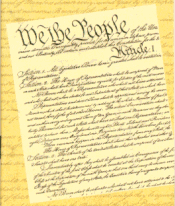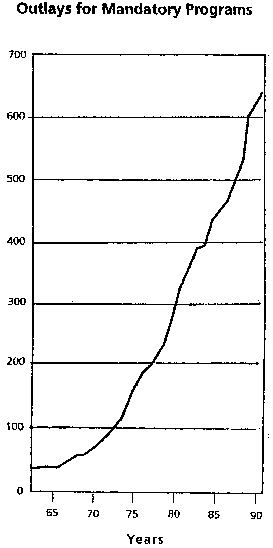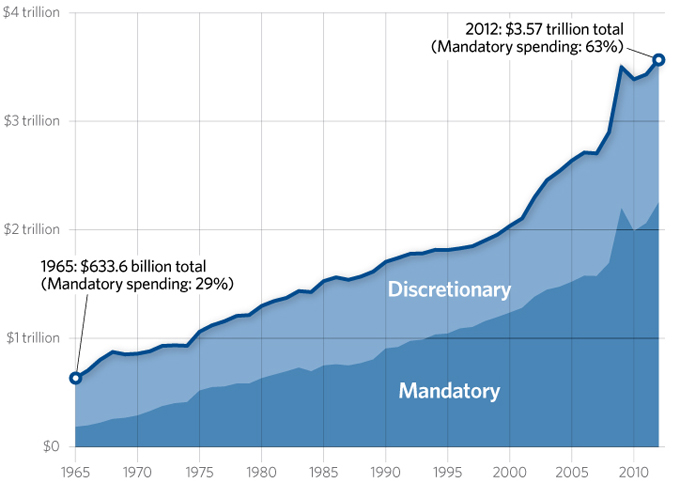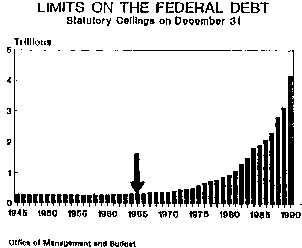The
"General Welfare"
Clause

|
by
JOHN W. BUGLER
( September 1994 )
|
We Americans find ourselves faced with the disquieting specter of
of a national debt
measured in trillions of dollars
--
a sum truly inconceivable.
Many economists and politicians tell us this debt portends a
disastrous financial collapse in the future and we worry.
Once debt free, we are now the largest debtor nation in the world and
as we find ourselves on the precipice we are confounded as to how
we got there.
For answers, however, we need look no further than
the farewell address of our first President, George Washington,
who, in reference to our constitution, warned,
"Let there be no change [in the Constitution] by usurpation.
For though this, in one instance may be the instrument of good, it is the customary
weapon by which free governments are destroyed."
[1]
Change in the constitution by usurpation?
When did that happen?
It happened in 1937!

Few americans realize that up until 1937 the Congress of the
United States conducted its business within the boundaries of
seventeen enumerated powers granted under Article I Section 8
of the United States Constitution, [See Appendix I, below] these powers defined
clearly the areas of national purposes over which Congress could
enact legislation including the allocation of funds and levying of
taxes.
Anything not set down in the enumerated powers was
considered outside the purview of the national government and
hence, a matter for the states.
There were occasional challenges to the concept but it was not
until Franklin Roosevelt's new deal that it was attacked in deadly
earnestness.
Ill winds prevailed against the Constitution in the 1930'S.
The country was in the depression and Franklin D. Roosevelt asked for extraordinary
"powers similar to those necessary in time of war,"
to meet the emergency.
Poorly crafted legislation, some of it not
printed in time for floor vote were rammed through a docile and
Compliant 73RD Congress.
Everything he asked for was given, with
little or no debate.
The first of the new deal statutes to reach the Supreme Court for
review, arrived in January 1935. in the sixteen months following,
The court decided ten major cases or groups of cases involving new
deal statutes.
In eight instances out of ten the decisions went
in favor of the United States Constitution and against the new deal.
Eight of the ten pieces of "must legislation" were found
to be unconstitutional.
The President reacted as one would after having received a kick in
a sensitive area.
He went to the american people with a fireside
chat and stated

"we have therefore, reached the point as a nation
where we must take action to
save the Constitution from the Court
and the Court from itself."
(March 9,1937) [II] [P.754]
The President declared war on the Supreme Court.
To appreciate the depth of FDR's resolve in such issues, one
need only read his correspondence to representative Snyder of
Pennsylvania asking Congress to pass the national bituminous coal
conservation act regardless of any doubts,
"however reasonable,"
that it might have about the bill's Constitutionality.
It appeared
in this case at least, the President was urging Congress to
disregard the Constitution. [2]
"In November 1936 the Democratic Party won an overwhelming victory
at the polls.
The election confirmed the Roosevelt administration
 in power and inspired the President to attempt a reorganization of
the Judiciary in order to win control of that last remaining
outpost of conservative Constitutionalism, the United States
Supreme Court." [2] [P.749]
in power and inspired the President to attempt a reorganization of
the Judiciary in order to win control of that last remaining
outpost of conservative Constitutionalism, the United States
Supreme Court." [2] [P.749]
Constitutional historians refer to what happened next as the
"Revolution of 1937."
The President proposed that for each
sitting justice over the age of seventy there be appointed one new
Justice to "help them with their case load."
In reality FDR
wanted to pack the court with six additional justices willing to
declare all of his "must legislation" Constitutional.
Chief Justice Hughes was traumatized.
He looked for a way to
disengage the Presidents plan which appeared almost certain to
pass both houses and be signed into law.
What to do?
What was
about to happen would ultimately lead our country to the clear and
present danger of economic insolvency.

One observer noted "Hughes was profoundly convinced that what was
at stake in the crises precipitated by the [Presidents] court plan
was nothing less than the fate of the Supreme Court's historic
role as
guardian of the Constitution."
He went on to state that
What happened next was a "decision to retreat in the immediate
skirmish in order to insure victory in the larger, struggle for
judicial supremacy."
[3] CP.111)
The supreme court at the time consisted of four conservatives,
three liberals, one moderate, and one swing.
The liberals were;
Stone, Cardozo and Brandeis.
The conservatives were:
McReynolds,
Sutherland,
Butler, and
Van Deventer.
The moderate was Hughes.
The swing was Roberts.
Hughes prevailed on Roberts to desert the Conservative camp, swing
over with him and join the three liberals in declaring the
social security cases [Steward Machine Co. v. Davis
(301 us 548, May 24, 1937)]
Constitutional.[4] [P.56]
This Roberts did, and by
so doing, took the wind from the sails of the President's court packing plan.
It went back to committee and died. one
Administration official called the court's action,
"the switch in time that saved nine."

This decision said in effect, Congress would no longer be held to
enumerated powers but instead could tax and spend for anything; so
long as it was for "general welfare."
But the words "General Welfare" in the introduction to the
enumerated powers of Article I Section 8 were never intended to
be an object for extension of the power to tax and spend; and up
until the cases noted above, no court ever so averred.[Appx. 1]
The supreme court surrendered to the new deal on the most
fundamental of constitutional issues. "it is scarcely conceivable
that Chief Justice Hughes and Justice Roberts... were unaware of
the political implications of their move. the President had lost a
battle but won a war.
In a remarkable series of decisions . ..the
Court executed the most abrupt change of face in its entire
history..."-[2] [p.753-754]
Justice Roberts, writing in 1951, said in effect:
"We voted against the Constitution
to save the Court."

His exact words were:
Looking back it is difficult to see how the Court could
have resisted the popular urge
... an insistence by the Court
on holding Federal power to what seemed its appropriate orbit
when the Constitution was adopted might have resulted in even more radical
changes to our dual structure than those which have gradually
accomplished through the extension of limited jurisdiction conferred on the
federal government.
[3] [p.I13]
His statement "limited jurisdiction"- "conferred on the federal
government" is understandable only when one considers that very
few "extensions" of "limited juribdiction" had been executed by
Congress from the time of the great retreat decisions,[1937]
Up to the year 1951.
(The year Roberts book was published)

Nothing much happened immediately after these decisions because of WW II;
then post war reconstruction with a strong conservative
Republican leadership under Bob Taft and a coalition of
conservative democrats;
then Korea;
then the Eisenhower years;
 then Kennedy [who basically was a fiscal conservative];
then Dallas; then Lyndon B. Johnson and the Great Society, [1965] the
arrival of which signaled the commencement of the full
implementation of "Stewart Machine Co. v. Davis"--1937.
then Kennedy [who basically was a fiscal conservative];
then Dallas; then Lyndon B. Johnson and the Great Society, [1965] the
arrival of which signaled the commencement of the full
implementation of "Stewart Machine Co. v. Davis"--1937.
Until this time, the American people's demands on government were
modest and for the most part the government lived within its means.
But LBJ and his cohorts, both Democrat and moderate Republican, said in effect,
"damn the enumerated powers, full speed ahead."
Something for everyone: spend now, pay later.
As time went on elected representatives in washington found it
virtually impossible to say no to constituent demands.
Many of
the demands were for good things.
[It seemed so, if someone else paid the bill.]
Most if not all of these things are best left to
the states, regional authorities, voluntary agencies and, yes,
families.
[In terms of sheer economic efficiency, nothing in all
of history ever equalled the family.
Whatever happened to them?]
Fifty legislative debates on the merits and uses of taxpayers
dollars for local purposes is very healthy.
Our founding fathers
believed in the idea and we practiced it, almost perfectly until
1965.
This gave great power and strength to our country.
People retained more than 80% of their wages,
whereas today they are left with less than 50% and many of us find ourselves
reduced to asking the general government for this or that.
"Give me, give me, give me."

Click to enlarge images.
(Refresh page, to restore.)
|
Consider the national debt.
Click to enlarge images.
(Refresh page, to restore.)

|
Approaching five trillion dollars
(when this paper was first written in 1994;
now over fifteen trillion dollars!)
How did this happen?
A "General Welfare Congress"
[session after session] made this happen.
With no limits on their taxing and
spending power, they became like children in a candy store.
Study the national debt and mandatory program curves;
they rise exponentially after the full implementation of the great society
[APPX.2].
Both national parties must share blame for the
enormous catastrophe befalling our country and its posterity.
It's really a "Catch 22".
You want to serve your country.
To serve
your country you must be in power [in Congress].
To be in power you must be re-elected.
To be re-elected you must out promise your opponent.
To out promise your opponent you must promise to spend
for the "General Welfare."
And it goes on and on and on, forever,
until one of three things happen:
- We adopt good moral sense and courage and say no to the
inordinate demands of our constituents and the special
interest groups.
-
This will never happen. Congress prefers to possess the power to buy the
allegiance of their constituents by providing for their "general welfare."
It is a payoff from organized government and "we the people" have been led to
believe someone else will pay for it down the line. i.e. our children.
-
Look at the behavior of the "new Congress".
Farm district Representatnes won't give back on subsidies.
Inner city Representatnes wonít give back on aid to teenage mothers.
Defense industry Representatnes wonít give back on defense spending.
The cotton and tobacco
representatnes wonít give back on their subsidies.
Good americans all.
Some are signers of the contract for america.
But they won't give back a dime.
They love the power.
-
We need a Constitutional Amendment clearly defining just what they
can tax and spend for.
[Governments control people--constitutions control governments]
and if we the people want them to keep all the power they now
have, then so be it. we can join together, singing,
"we donít have to live in the
future, our children do.
We want ours and we want it now."
-
Our nation suffers an economic collapse and/or a total loss
of freedom due to excessive taxation and national debt.
This is why the balanced budget amendment is a danger.
Congress will
balance the budget on the backs of the american workers and entrepreneurs.
Congress will not resist unlimited spending power.
Why? Because it feels too
good and they are spending other peoples money.
Your money and my money.
Itís painless when itís not your money.
And the nation as we know it today,
will continue the ongoing surrender of individual and economic liberty to a
form of government that can best be described as legislative despotism.
-
Our newly-elected Representatives propose a Constitutional
Amendment to the Several States for their consideration,
which shall state that:
- The phrase "the Common Defense and the General Welfare" in
Article I Section 8 of the U.S. Constitution are not
grants of power but merely introductions to the enumerated
powers concerning the common defense and the general welfare.
-
That all powers seized and accrued to the federal government
since the "revolution of 1937" be submitted to the several
states as part of this amendment and they as a whole shall
vote up and down as to whether or not these seized powers
should be returned to their rightful owners, i.e. the states
or the people, or be added to the enumerations presently
extant in Article I Section 8 of the U.S. Constitution.
-
And that all future additions to those enumerated powers for
taxing and spending found in Article I Section 8 of the
U.S. Constitution be done as the founding fathers provided,
by Amendment to the Constitution.
In his farewell address, George Washington speaking on our dual
federal system stated: "the spirit of encroachment tends to consolidate
the powers...in one, and thus to create?, . . .
a real despotism
. *
He went on to warn:
Let there be no change in the constitution by usurpation;
for though this, in one instance, may be the instrument of good, it
is the customary weapon by which free governments are destroyed.
[5] [P. 2241]
For "customary weapon" read "
Stewart Machine Co. v Davis" (301 US 548) 1937.
Presently our ship of state is aground on the shoals of uncertain
centralism.
At this very moment a great storm -and high tide of
optimism have begun to shake her free; but any freedom will be
short lived without an amendment enunciating clearly what the
founding fathers intended:
The General Welfare clause in
Article I Section 8
is an introduction to the enumerated powers that follow
and not itself a grant of power.
CLOSING
 The limits on federal power to legislate for the "general welfare"
remains, to this date, undefined and presumably, boundless
The limits on federal power to legislate for the "general welfare"
remains, to this date, undefined and presumably, boundless
 The question that begs an answer is,
"if the framers of our Constitution,
The question that begs an answer is,
"if the framers of our Constitution,
 who labored so resolutely in Philadelphia that
torridly hot summer in 1787
intended the powers of Congress to
have no boundaries, why did they bother to enumerate seventeen?"
who labored so resolutely in Philadelphia that
torridly hot summer in 1787
intended the powers of Congress to
have no boundaries, why did they bother to enumerate seventeen?"
 James Madison, when asked if the "general welfare" clause was a
grant of power, replied in 1792,
in a letter to Henry Lee,
James Madison, when asked if the "general welfare" clause was a
grant of power, replied in 1792,
in a letter to Henry Lee,
If not only the means but the objects
are unlimited,
the parchment [the Constitution]
should be
thrown into the fire at once.
[6] [p.257]
DEDICATION
This effort is dedicated to the memory of my mother and father,
and to all service men and women
who gave their lives
for the
survival of our posterity.
John W. Bugler
Constitutional Awareness
bugler@bugler.org
|
|
REFERENCES
- Pusey, Merlo, J., Charles Evans Hughes [Vol.2]
[Columbia University Press New York, 1963
- Kelly, A.H. and Harbison, W.A., The American Constitution - Its
Origins and Development [W.W.Norton & Co. Inc. New York, 1948
- Mason, Alpheus, The Supreme Court from Taft to Warren
[Louisiana State University Press: Baton Rouge, 1958]
- Krock, Arthur, The Consent of the Governed - And Other Deceits,
[ Little, Brown and Company---Boston, Ma. 1971]
- Hickey, W., The Constitution of the United States of America,
with Papers of George Washington. [Philadelphia, 1853]
[Farewell Address of George Washington, President, to the people
of the United States, September 17, 1796 ]
- Brant, Irving the Fourth President - A Life of James Madison
[Eyre & Spottiswoode (Publishers) Ltd. London, 1970
|